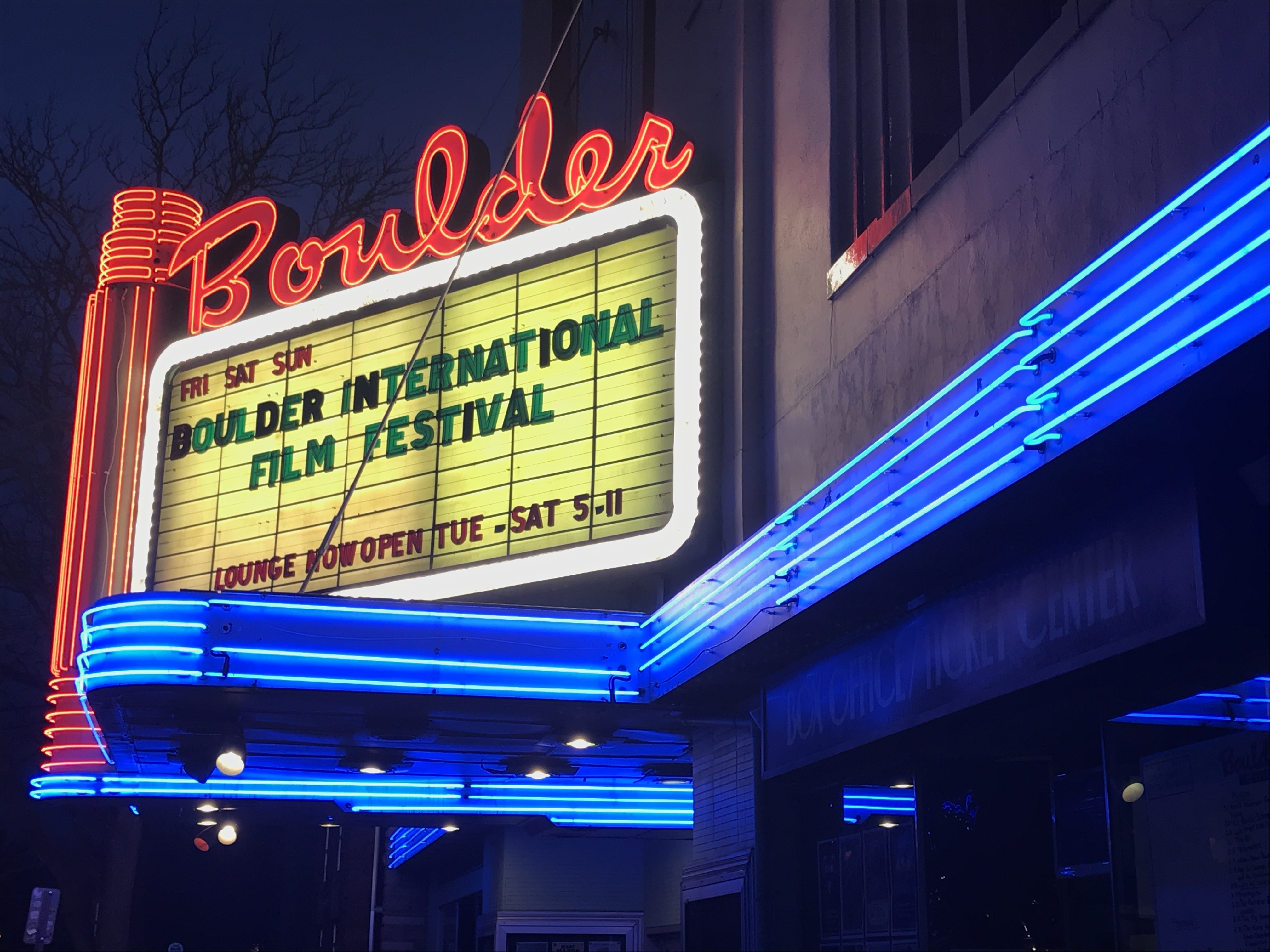The 13th annual Boulder International Film Festival returned this weekend with 39 feature-length films and a spectrum of shorts. Being documentary-focused, the festival proved to be melancholic. The weekend was filled with films about the injustices in our world from refugees to government corruption to mental health. Though grim, the festival was worth attending – informative, well-organized and of course, it featured some incredible films from around the world. Here are our favorite films from what we were able to catch this past weekend.
Opening Night – Their Finest
This British film is based on the novel “Their Finest Hour and a Half” by Lissa Evans. This adaptation to the big screen came with no lack of talent including Gemma Arterton (Hansel & Gretel: Witch Hunters, Quantum of Solace), Bill Nighy (Love Actually, Harry Potter), Sam Claflin (The Hunger Games, Me Before You) and many more. However, the female cast stole the show, often cast in diverse occupational roles such as screenwriters, office managers or an acting agent. The film itself revolved around the screenwriting and creation of a WWII film amidst the war itself unraveling in London. In a way, it was like watching a movie within a movie. Their Finest is visually appealing and has a theatrical feeling throughout whether it be a slightly over exaggerated scene or a time change signaled by a new setting (i.e. snow-covered London or a moonlit riverbank). The film could be best described as a romantic comedy, but is certainly packed with drama. Heartfelt or charming moments are intertwined with suspense and action through the added tension of London bombings. Overall, this adaptation is a period-piece well worth your time. Sound good? You can check it out when it’s released to theaters April 7.
Winner
Score – A Film Music Documentary
Award – Boulder International Film Festival Best New Filmmaker (Matt Shrader)
If you’re a fan of movie soundtracks, you will only love them more with this documentary about the music in our motion pictures. It so lovingly paints the process of creating music for movies, from intimate displays of the composers to odes for the most iconic of soundtracks. Star Wars, E.T., Planet of the Apes and 2001: A Space Odyssey are a few of the major movies discussed in the film. A gem of a documentary for music lovers, film lovers and anyone who appreciates seeing a person fulfill their talents to the fullest.
Winner
Nocturne in Black
Award – Boulder International Film Festival Best Short
Nocturne in Black portrays a young man and his passion for music in a harrowing tale of terrorist control and the arts. This short explores one of the horrible downfalls of jihadist rule for Middle Eastern civilians. Violent and tense, but sentimental with unifying themes like music and community, it’s an eye-opening short that everyone should take the time to see. Nocturne in Black is cinematic and powerful with incredible performances. Expect to be holding back tears long after the credits roll.
The Borneo Case
The Borneo Case follows the struggle of activists and natives of Sarawak (a Malaysian state on Borneo) against powerful figures in the Malaysian government who are destroying the tropical rainforest for their own personal monetary gain. By following the money of the tropical timber industry, a small group of people proves that a public official, Taib Mahmud, made money illegally while destroying vast swathes of native homeland. The bravery and dedication of Clare Rewcastle-Brown, Mutang Urud, Bruno Manser and many others in the film prove that great effort to change a system is better than sitting idly by. But, don’t get your hopes up too much. This documentary is not very uplifting, and though it’s informative and shocking, there is no solid resolution. The timber industry may suffer, but there are other immediate threats which need to be addressed with as much haste.
Black Code
Whether you are unconvinced about the importance of cyberspace privacy or if you are certain that everything you do with modern technology is monitored, this documentary will prove that no matter what you think digital rights are important. Based on the book by Professor Ron Deibert, the film investigates instances of control, manipulation and monitoring by governments and other national institutions in Tibet, Brazil, Ethiopia and Syria. First-hand accounts of hacking, live-streaming police brutality, gender targeting, torture and even murder prove that controlling the internet is not only dangerous to our freedom but also physically and psychologically damaging. Especially in light of recent events with governments hacking other governments, this documentary is timely and necessary to inform regular citizens about the battle for control of cyberspace. Warning—after seeing this you may feel obliged to do paranoid things like putting tape over the webcam lens on your computer, just saying.
Dean
Comedian Demetri Martin has excelled as a different kind of “triple threat” in Dean, a feature film written, directed and starring him. Maybe even quadruple threat because his iconic comic illustrations are also part of the film, with several shots showing Dean (Martin) drawing simultaneously with both of his hands (this is not an easy task—you try it!) After the loss of his mother, Dean struggles with his artistic career and with relating to his father (Kevin Kline), who provides an endearing performance as a somewhat aloof widower. Nicky (Gillian Jacobs), a California girl who wins Dean’s heart, is charming but manipulative, with Jacobs’ own humor shining through. Ginger Gonzaga’s performance as Nicky’s best friend Jill stole the spotlight with her bitchy attitude and pronounced facial expressions that ultimately come from being painfully honest—something that all the other characters lack. Though Martin’s stand-up humor relies on quippy one-liners, this film showcases his deeper side and nails the poignancy of dealing with grief while still continuing to live your life. Of course, that doesn’t mean it lacks humor—you’ll be laughing through the whole movie.
Maurizio Cattelan: Be Right Back
Maurizio Cattelan is either the best artist in modern times, or the worst. In this documentary by filmmaker Maura Axelrod, Cattelan’s rise to an unusual level of stardom within the art world is tracked with interviews of his few close friends, gallerists, curators and the man who impersonates Cattelan for public appearances. Through these accounts and countless views of his artworks throughout the years (starting in the early ’90s), Cattelan is represented as a prankster, a controversy-igniter, an artistic conman and a social psychologist. As one of the collectors of his artwork noted, “he’s always seizing, never asking”—a tribute to his notoriety in the art world. That notoriety evolved with numerous stunts in New York which included stealing another artist’s exhibition from a neighboring gallery for his own show, faking a large number of Flash Art magazines with his own work on the cover and distributing them to stores, reporting to the police a stolen “invisible” artwork and using the one-page police report as the only “artwork” in a gallery. His works are mostly large-scale sculptures, conceptual pieces which use actual taxidermy animals or wax figures of realistic people. The first reaction may be to laugh, but some of his pieces have really pissed some people off (see “Ninth Hour“). Especially when all of Cattelan’s work is exhibited at once at the Guggenheim Museum, it becomes painfully obvious that his work has been profoundly inspired by suffering, sadness and failure. This documentary illuminates Cattelan’s multi-million dollar legacy and ultimately turns the prank back onto the viewers, who must decide for themselves if it’s all a joke or a scathing commentary on the art world itself.
God Knows Where I Am
“Dear God, please save me,” were the opening words of God Knows Where I Am, ironically screened at the First Presbyterian Church of Boulder. The film was co-presented by Mental Health Colorado who stuck around after the show to have a discussion about mental health – something much needed after the incredibly heavy film we were about to witness. Only God Knows Where I Am takes place in rural New Hampshire 2008 but documents the past of Linda Bishop – a mother, sister and schizophrenic. The film divulges into Bishop’s diary which chronicles her last few months alive as a down spiraling recluse, all while visiting the events leading up. Moments from the journal came to life – artistically with dark and eerie nature imagery. Overall, God Knows Where I Am is gorgeously shot, sweeping the camera through landscapes and houses, all playing on the viewers intrigue. Mysterious and gripping, yet all-the-while sentimental, the film tackles themes from mental illness and homelessness to religion and family. Though difficult to watch, this unforgettable film and heartbreaking true story of tragedy will resonate with you for days to come.
Finding Oscar
Finding Oscar is a documentary directed by Ryan Suffern and produced by Steven Spielberg. Suffern spoke for a moment before the film describing Finding Oscar as a “harrowing tale with a light at the end of the tunnel.” And that it is. The documentary revolves around the 1972 Guatemalan Dos Erres massacre. Never heard of it? You probably should have – and that’s why this film is so important. Following two dedicated female Guatemalan investigators working alongside members of U.S. agencies, this documentary revolves around the slaughter of an entire Guatemalan village by their own government – and putting the pieces together to establish accountability. Engaging and thought provoking, the film tells a disturbing true story of conspiracy in politics, truth and justice. Finding Oscar is a captivating crime documentary that will grab your attention from the first second and never lets go.
Holy (un)Holy River and Gyalmu’s House
Holy (un)Holy River is a 60-minute documentary created by Colorado filmmaker Pete McBride and won Best Film at BANFF Mountain Film Festival. But before we dive into the feature documentary, let’s talk about the doc-short that played beforehand, Gyalmu’s House. The film followed a documentary filmmaker as she joins a humorous and light-hearted Tibetan woman named Nima Gyalmu. It’s set one year after an earthquake struck Gyalmu’s small Nepali town causing an avalanche to sweep away their homes and bury alive hundreds of villagers in the valley below. The film offers fantastic scenery while spotlighting the humor and hope of the villagers suffering at the hands of a devastating natural disaster – never blaming nature, rather blaming themselves for not worshipping the mountains – their Gods – enough.
After the roughly 20-minute short, Holy (un)Holy River started. The film opens with a Voltaire quote, “I am convinced that everything has come down to us from the banks of the Ganges.” From there the documentary follows a group of filmmakers determined to travel the Ganges River in its entirety – from the peaks of the Himalayas to the Sea of Bengal. Why? To determine each and every factor that contributes to the pollution of the world’s most sacred river. Focusing around global warming, over population, mass manufacturing and the Hindu faith, this informative film showcases different cultural traditions and practices that all contribute to the Ganges pollution. The most interesting takeaway from this segment of films, Gyalmu’s House and Holy (un)Holy River, is the way they contrasted. Gyalmu’s House shows us what some believe happens when you don’t worship nature enough. Holy (un)Holy River shows what happens when you worship it too much.
Nowhere to Hide
Nowhere to Hide came to BIFF shortly after winning Best Feature-Length Documentary at the 2016 Amsterdam International Film Festival. The documentary is conducted by an amateur Iraqi family man living in the “Triangle of Death.” Beginning the day after US forces pulled out of Iraq, Nori Sharif transitions from an ambulance technician and nurse, to a video journalist. From there on, the viewer is thrown into the shoes of an Iraqi refugee fighting, fleeing and documenting devastation all-the-while desperately trying to keep his family safe. Nowhere to Hide captures disturbing moments and first-hand accounts of kidnappings, poverty, executions, car bombings, disease, protests and more. Revolving around an ever-perplexing, constantly evolving and undiagnosed war, the audience feels the frustrations of those still left in the crosshairs. The film was co-presented by the International Rescue Committee who stuck around after the film to talk about what we can do to help.
Sauti (Voice)
“Things don’t always go as you’d hoped. But that doesn’t mean you lose hope.” That’s the sentiment of this touching documentary by Boulder filmmakers Gayle Nosal and Beret Strong that follows the lives of five young women living as refugees in Uganda who attend the Think Humanity Girls Hostel for an education. Through their own poetry, drawings and video-recording, a picture emerges about the lack of opportunity they are offered with the label “refugee,” and about the magnanimous fortitude of their spirits and dreams despite it. Sauti means “voice” in Swahili, and Nosal and Strong intended for the voices of these women to be heard—both in content and tone. The documentary spans four years in each of their lives and comes at a timely junction, when we all need to understand what being a refugee really means. At this Colorado premiere, one of the young women, Favourite Regina and the former education manager at Think Humanity Girls Hostel Joshua Habarugira were in attendance, receiving a standing ovation when they took the stage after the screening for a question and answer session.
Winner
Closing Night – Chasing Coral
Award – Boulder International Film Festival Best Documentary
Award – Boulder International Film Festival Best Call2Action Film
Award – Boulder International Film Festival People’s Choice Award – Best Feature Length Film
Just this year Chasing Coral won the Audience Award for Best Documentary at Sundance Film Festival – and came straight to Boulder International Film Festival afterwards. The film is directed by Chasing Ice’s Jeff Orlowski who was in attendance with his crew – almost all of who are Coloradans. Chasing Coral follows suit from Orlowski’s previous documentary Chasing Ice — both of which follow teams attempting to document changes in nature caused by climate change. This time around, it’s a marine mission with coral bleaching as the focus. Informative yet never boring, this film follows researchers and filmmakers alike as they capture oceanic photography that is both breathtaking or utterly disheartening. The film instills a sense of hopelessness, conveyed from these oceanic experts to the audience as they reluctantly ask for help during a time where it may already be too late. Chasing Coral shows just how essential powerful photography and videography are in a documentary about climate change.
Full list of winners at Boulder International Film Festival:
Best CineCHEF – 24 Carrot Bistro
Best New Filmmaker – Matt Shrader, Score: A Film Music Documentary
Best Short Film – Nocturne in Black
Best Short Documentary – DoDo’s Delight
Best Call2Action Film – Chasing Coral
Best Music Documentary – Rumble: The Indians Who Rocked the World
Best Documentary – Chasing Coral
Best Feature Film – Glory
People’s Choice Award – Short Film – La Femme et la TGV
People’s Choice Award – Feature Length Film – Chasing Coral





